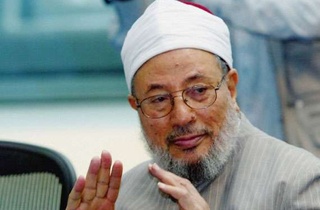In a press release, head of Hamas’s politburo Ismail Haniyeh said that the Palestinian people, the Arab nations, and the Islamic Ummah are deeply saddened by the death of Al-Qaradawi. “He passed away after a life full of giving in all arenas”
Haniyeh explained that the prominent Muslim scholar has tremendously supported the Palestinian cause, Jerusalem and the Al-Aqsa Mosque, confirming that the entire world bears witness to Al Qaradawi’s contributions to the Muslim Ummah and the world.
“He has dedicated his life to serving the issues of the Ummah and defending the Palestinian cause, at the heart of which is Jerusalem and the Al-Aqsa.”
With the death of scholar Al-Qaradawi, the Islamic Ummah has lost one of its prominent figures and voices of freedom, the senior Hamas official added.
Haniyeh added: “We, in Hamas movement, are extremely saddened by the death of this prominent scholar, and we pray to Allah to shower his soul with mercy. Hamas also extends condolences to the family of the Sheikh, his students, and the entire Arab and Islamic world”.
Born in 1926, while Egypt was still under British colonial rule, Al-Qaradawi combined religious education with anti-colonial activism during his youth. His activism against the British occupation and later, his association with the Muslim Brotherhood led to his arrest several times during the 1950’s.
He moved to Qatar in the early 1960s when he was appointed Dean of the Faculty of Shariah at Qatar University and then later granted Qatari citizenship.
Ibrahim Salah Al-Nuaimi, chairman of the Doha international center for interfaith dialogue, described Qaradawi as a “moderate, great scholar”.
“He worked closely with many representatives of different faiths to bring together harmony and to really put down the hate speeches” that would sometime arise between different faiths,” Al-Nuaimi told Al Jazeera.
One of his early famous works was the 1973 book Fiqh al-Zakat (The Jurisprudence of Zakat). Al-Qaradawi also sought to reinterpret historical rules of Islamic law in order to better integrate Muslims in non-Muslim societies.
He supported suicide bombings against Israel in the Second Intifada and also voiced support for the Iraqi insurgency that erupted after the US-led invasion of 2003 toppled Saddam Hussein. His stance on both issues won him a long-standing infamy in the West.
In 2009, the zionist regime's Shin Bet internal security agency accused al-Qaradawi of allocating $21 million to a charity funded by Hamas to set up militant infrastructure in Jerusalem. Hamas, which rules the Gaza Strip, denied the allegations. (ILKHA)



 Güncel
Güncel
 Güncel
Güncel
 Eğitim
Eğitim
 Dünya
Dünya
 Güncel
Güncel
 Dünya
Dünya
 Güncel
Güncel
 Güncel
Güncel
 Güncel
Güncel
 Dünya
Dünya





